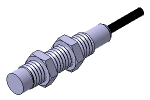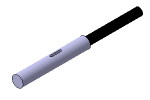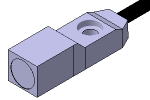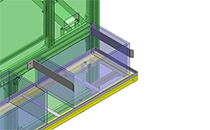(!) Since support from Microsoft will end on January 14th, 2020, Windows 7 will be excluded from the recommended environment from December 15th, 2019 on this site. Vì lý do Microsoft kết thúc hỗ trợ cho Windows 7 vào ngày 14/01/2020, Windows 7 sẽ là hệ điều hành không được khuyến khích sử dụng với trang web này từ ngày 15/12/2019.
Search by Category / Brand Tìm theo danh mục, nhãn hiệu
Search by Category Tìm theo danh mục
- [Thông báo] Cập nhật địa chỉ kho tập kết hàng hóa tại khu vực miền Nam của MISUMI Việt Nam. Xem chi tiết.
[Announcement] Update on warehouse address in the Southern region of MISUIMI Vietnam. See more. - [Cảnh Báo] Thủ Đoạn Lừa Đảo Từ Nhân Viên Giao Hàng – Yêu Cầu Trả Phí Ship. Xem chi tiết.
[Warning] Fraud Calling from Shipper - Asking to Pay Shipping Fee. See more.
OMRON Proximity Sensors(Amplifier:Relay Type)
Cảm biến tiệm cận là một trong những thành phần quan trọng trong các hệ thống tự động hóa nhà máy. Các cảm biến này được thiết kế để phát hiện vật thể một cách chính xác mà không cần tiếp xúc vật lý, đảm bảo hoạt động hiệu quả và chính xác trong các ứng dụng công nghiệp khác nhau. Nguyên lý hoạt động của cảm biến tiệm cận là thứ khiến chúng trở nên khác biệt. Chúng hoạt động bằng cách phát ra một trường điện từ và phân tích các dịch chuyển trong trường này để xác định vị trí của các vật thể. Phương pháp phát hiện không tiếp xúc này giúp ngăn ngừa hao mòn, hứa hẹn hiệu quả lâu dài và giảm chi phí bảo trì. Nhờ tính linh hoạt của chúng, các cảm biến tiệm cận của chúng tôi đã được sử dụng trong nhiều ứng dụng bao gồm hệ thống băng tải, dây chuyền lắp ráp và robot. Trong các hệ thống băng tải, chúng cho phép việc phân loại và xử lý tự động, giúp tăng năng suất. Trên dây chuyền lắp ráp, chúng theo dõi vị trí các bộ phận để sắp xếp và căn chỉnh chính xác. Trong lĩnh vực robot, chúng phát hiện vật thể và tránh va chạm, tăng cường tính an toàn và hiệu quả. MISUMI cung cấp nhiều loại cảm biến tiệm cận, bao gồm cảm biến điện cảm để phát hiện vật thể bằng kim loại, cảm biến kiểu điện dung cho cả vật thể bằng kim loại và phi kim loại, cảm biến quang điện sử dụng ánh sáng để cảm nhận. Cảm biến của chúng tôi thân thiện với người dùng và dễ lắp đặt, yêu cầu bảo trì ở mức tối thiểu. Nếu bạn đang tìm kiếm cảm biến tiệm cận 3 dây với mạch cảm biến tiệm cận phù hợp và thân thiện với người dùng, chúng tôi có nhiều mẫu khác nhau để bạn lựa chọn. Cảm biến tiệm cận của chúng tôi được thiết kế để đáp ứng mọi nhu cầu của bạn, giúp nâng cao hiệu suất và năng suất tổng thể cho các dự án của bạn.
Các loại cảm biến tiệm cận phổ biến: cảm biến tiệm cận điện cảm, cảm biến tiệm cận điện dung, cảm biến tiệm cận điện từ, cảm biến tiệm cận hồng ngoại, cảm biến tiệm cận kim loại, cảm biến tiệm cận npn, cảm biến tiệm cận pnp, cảm biến tiệm cận quang, cảm biến tiệm cận từ, cảm biến vùng, cảm biến tiệm cận 2 dây, cảm biến tiệm cận 2 dây 220v, cảm biến tiệm cận 2 dây 24vdc, cảm biến tiệm cận 3 dây 24vdc, cảm biến tiệm cận 3 dây npn, cảm biến tiệm cận 4 dây, cảm biến tiệm cận 220v, cảm biến tiệm cận Omron, cảm biến tiệm cận Omron E2E, , cảm biến tiệm cận Omron 2 dây, cảm biến tiệm cận Autonics, cảm biến tiệm cận Autonic, cảm biến tiệm cận mini, cảm biến tiệm cận 3 dây, cảm biến tiệm cận phi 8, cảm biến tiệm cận điện dung Omron, cảm biến tiệm cận 3 dây Omron, cảm biến vùng an toàn, cảm biến vùng Autonic, cảm biến vùng Omron. Misumi Việt Nam cung cấp các loại cảm biến tiệm cận chính hãng chất lượng, giá tốt, giao nhanh miễn phí.
Brand |
|
|---|---|
Filter By |
|
| CAD |
|
| Days to Ship |
|
2 itemsMặt hàng
- Sort By
-
You can add up to 6 items per a category to the compare list.

![Amplifier Relay Proximity Sensor [E2EC]](//vn.misumi-ec.com/linked/material/mech/OMR1/PHOTO/OMR1_221000398544.jpg?$product_view_b$)

Amplifier Relay Proximity Sensor [E2EC]
OMRON
[Features]· Ultra-small and long range detection realized.· Small shield type sensor head ø3 to M12.· Embedding in metal is possible.· Robotic code standard adopted (DC 2 wire type).· There is an indicator light in the relay code (amplifier part) and operation confirmation is easy.· Supply voltage range DC5 to 24V (DC 3 wire type only).
Sensor Shape Detection Object Operating Environment Detection distance L1 [classification](mm) Detection Head Size, Dimension M Shield Detection Type Detection Head Size, Dimension D(Ø) Amplifier Detection Head Size, Dimension L2 (Range)(mm) Sensor Case Material Protection Structure (DIN40050-9) Sensor Detection Surface Material Protection Structure (IEC) Detection Head Size, Dimension W (Range)(mm) Detection Head Size, Dimension H (Range)(mm) Screw / Cylinder Shape Magnetic Metal Standard / Space Saving / Oil Resistance Strengthened / Cold Resistant ~1 / ~2 / ~3 / ~5 M12 Shield Front Surface Detection 3 ~ 8 Relay Type 10~20 Brass (Nickel Plating) - ABS Resin IP64 / IP67 - - From: 1,500,000 VND Special Price Days to Ship: Số ngày giao hàng: Same day or more  Same day or more
Same day or more
-
You can add up to 6 items per a category to the compare list.
![Stainless steel detection surface amplifier relay proximity sensor [E2EC-M/Q]](//vn.misumi-ec.com/linked/material/mech/OMR1/PHOTO/IMG_WIN_E2EC-M_-Q_DS_J_1_1.jpg?$product_view_b$)
Stainless steel detection surface amplifier relay proximity sensor [E2EC-M/Q]
OMRON
[Features]· Adopt stainless steel detection surface to enhance the robustness of the detection head.· We also offer spatter resistant products for welding process.
Sensor Shape Detection Object Operating Environment Detection distance L1 [classification](mm) Detection Head Size, Dimension M Shield Detection Type Detection Head Size, Dimension D(Ø) Amplifier Detection Head Size, Dimension L2 (Range)(mm) Sensor Case Material Protection Structure (DIN40050-9) Sensor Detection Surface Material Protection Structure (IEC) Detection Head Size, Dimension W (Range)(mm) Detection Head Size, Dimension H (Range)(mm) Cylinder Shape Magnetic Metal Standard / Sputter Resistant / Oil Resistance Strengthened / Cold Resistant ~2 - Shield Front Surface Detection 8 Relay Type 10~20 Stainless Steel / Stainless Steel (SUS303) coated with Fluororesin - Stainless Steel / Stainless Steel (SUS303) coated with Fluororesin IP67 - - From: 2,570,000 VND Days to Ship: Số ngày giao hàng: 6 Day(s) or more  6 Day(s) or more
6 Day(s) or more
| BrandNhãn hiệu |
|---|
| Product SeriesDòng sản phẩm |
| CADCAD |
| From |
| Days to ShipSố ngày giao hàng |
| Sensor Shape |
| Detection Object |
| Operating Environment |
| Detection distance L1 [classification](mm) |
| Detection Head Size, Dimension M |
| Shield |
| Detection Type |
| Detection Head Size, Dimension D(Ø) |
| Amplifier |
| Detection Head Size, Dimension L2 (Range)(mm) |
| Sensor Case Material |
| Protection Structure (DIN40050-9) |
| Sensor Detection Surface Material |
| Protection Structure (IEC) |
| Detection Head Size, Dimension W (Range)(mm) |
| Detection Head Size, Dimension H (Range)(mm) |
You can add up to 6 items per a category to the compare list. | You can add up to 6 items per a category to the compare list. | |
| BrandNhãn hiệu | OMRON | OMRON |
| Product SeriesDòng sản phẩm | Stainless steel detection surface amplifier relay proximity sensor [E2EC-M/Q] | |
| CADCAD |
|
|
| From | 1,500,000 VND Special Price On Sale Till 31/03/2025 | 2,570,000 VND- |
| Days to ShipSố ngày giao hàng | Same day or more | 6 Day(s) or more |
| Sensor Shape | Screw / Cylinder Shape | Cylinder Shape |
| Detection Object | Magnetic Metal | Magnetic Metal |
| Operating Environment | Standard / Space Saving / Oil Resistance Strengthened / Cold Resistant | Standard / Sputter Resistant / Oil Resistance Strengthened / Cold Resistant |
| Detection distance L1 [classification](mm) | ~1 / ~2 / ~3 / ~5 | ~2 |
| Detection Head Size, Dimension M | M12 | - |
| Shield | Shield | Shield |
| Detection Type | Front Surface Detection | Front Surface Detection |
| Detection Head Size, Dimension D(Ø) | 3 ~ 8 | 8 |
| Amplifier | Relay Type | Relay Type |
| Detection Head Size, Dimension L2 (Range)(mm) | 10~20 | 10~20 |
| Sensor Case Material | Brass (Nickel Plating) | Stainless Steel / Stainless Steel (SUS303) coated with Fluororesin |
| Protection Structure (DIN40050-9) | - | - |
| Sensor Detection Surface Material | ABS Resin | Stainless Steel / Stainless Steel (SUS303) coated with Fluororesin |
| Protection Structure (IEC) | IP64 / IP67 | IP67 |
| Detection Head Size, Dimension W (Range)(mm) | - | - |
| Detection Head Size, Dimension H (Range)(mm) | - | - |
Loading...Tải…
ConfigureTạo
Specification/DimensionsĐặc điểm kỹ thuật / Kích thướcĐặc điểm kỹ thuật / Kích thước
-
Sensor Shape
-
Screw

-
Cylinder Shape

-
Square

-
Low Profile

-
Screw
-
Detection Object
- Magnetic Metal
- Nonmagnetic Metal
- Non-Metal (Capacitance Type)
-
Operating Environment
- Standard
- Space Saving
- Heat Resistant
- Sputter Resistant
- Chemical Resistant
- Aluminum Chips
- Oil Resistance Strengthened
- Cold Resistant
- Water-proof, Drip-proof
-
Detection distance L1 [classification](mm)
-
Detection Head Size, Dimension M
-
Shield
- Shield
- Non Shield
-
Detection Type
-
Detection Head Size, Dimension D(Ø)
-
Amplifier
- Built-in Type
- Separated Type
- Relay Type
- Amplifier Only
-
Detection Head Size, Dimension L2 (Range)(mm)
-
Sensor Case Material
-
Protection Structure (DIN40050-9)
-
Sensor Detection Surface Material
-
Protection Structure (IEC)
-
Detection Head Size, Dimension W (Range)(mm)
-
Detection Head Size, Dimension H (Range)(mm)
Application example related to this categoryVí dụ ứng dụng liên quan đến danh mục này
Related Categories to Proximity SensorsDanh mục liên quan đến Proximity Sensors
FAQ Proximity Sensors
- Question: how to install proximity sensor
- Answer: Installing a proximity sensor, whether it is a capacitive or inductive type, involves the following general steps:
1. Select the Mounting Location: Choose an appropriate location for the sensor installation. Consider factors such as the desired detection range, the type of object to be detected, and any environmental conditions that may affect the sensor's performance.
2. Prepare the Mounting Surface: Ensure that the mounting surface is clean, flat, and suitable for attaching the sensor securely. Remove any dirt, debris, or contaminants that may interfere with the sensor's operation.
3. Connect the Wiring: Connect the wiring of the proximity sensor to the appropriate power source and signal output. Follow the manufacturer's instructions for the specific sensor model to ensure correct wiring connections.
4. Mount the Sensor: Securely mount the sensor onto the prepared mounting surface using appropriate mounting hardware. Ensure that the sensor is aligned properly and securely attached to prevent any movement or misalignment.
5. Adjust the Sensitivity (if applicable): Some proximity sensors may have sensitivity adjustments to fine-tune the detection range. Refer to the manufacturer's instructions to set the desired sensitivity level based on the application requirements.
6. Test the Sensor: Once the sensor is installed, test its functionality by introducing objects within its detection range. Ensure that the sensor reliably detects the presence or absence of objects as expected.
It's important to note that the specific installation steps may vary depending on the sensor model and the application requirements. Always refer to the manufacturer's instructions and guidelines for the particular proximity sensor being installed. - Question: How does a proximity sensor work?
- Answer: Proximity sensors work by detecting the presence or absence of objects within a certain range without physical contact.
1. Capacitive proximity sensor, it works by measuring changes in capacitance. When an object enters the sensor's range, it disturbs the electric field around the sensor, causing a change in capacitance. The sensor detects this change and triggers a response, indicating the presence of the object.
2. Inductive proximity sensor, on the other hand, uses electromagnetic fields. It generates an electromagnetic field and when a metallic object enters the field, it induces eddy currents in the object. This, in turn, creates changes in the sensor's electromagnetic field, which the sensor detects to determine the presence of the object. - Question: What are the different types of proximity sensors?
- Answer: There are several types of proximity sensors used in engineering applications:
1. Capacitive Proximity Sensors: These sensors detect objects by measuring changes in capacitance. They are effective for detecting non-metallic objects like liquids or plastics.
2. Inductive Proximity Sensors: Inductive sensors use electromagnetic fields to detect metallic objects. They generate an electromagnetic field and detect changes in the field when a metallic object is present.
3. Ultrasonic Proximity Sensors: Ultrasonic sensors emit high-frequency sound waves and measure the time it takes for the waves to bounce back after hitting an object. They are suitable for detecting objects at longer distances.
4. Optical Proximity Sensors: Optical sensors use light to detect the presence or absence of an object. This category includes infrared, laser, and photoelectric sensors. They can be used in various applications depending on the specific sensor type. - Question: What are the applications of proximity sensors?
- Answer: Proximity sensors, including capacitive proximity sensor and inductive proximity sensor, have numerous applications across various industries. Some common applications include object detection, presence sensing, position control, level detection, and automation processes. They are used in industries such as automotive manufacturing, food processing, packaging, robotics, conveyor systems, and many more. Proximity sensors are employed to detect the presence or absence of objects, control the movement of equipment, ensure safety in automated systems, and optimize efficiency in industrial processes.
- Question: How accurate are proximity sensors?
- Answer: Proximity sensors, including capacitive proximity sensor and inductive proximity sensor, can offer accurate detection within their defined range, typically spanning from a few millimeters to several meters. However, accuracy may be influenced by various factors such as the specific sensor type, environmental conditions, and the requirements of the application.
- Câu hỏi: Làm thế nào để lắp đặt cảm biến tiệm cận?
- Trả lời: Việc lắp đặt một cảm biến tiệm cận, kể cả loại điện dung hay điện cảm, đều bao gồm các bước chung sau đây:
1. Chọn vị trí lắp đặt: Chọn một vị trí lắp cảm biến phù hợp. Hãy xem xét các yếu tố như phạm vi phát hiện, loại vật thể cần phát hiện, và bất cứ điều kiện môi trường nào có thể ảnh hưởng đến hiệu suất của cảm biến.
2. Chuẩn bị bề mặt lắp: Hãy đảm bảo rằng bề mặt lắp phải sạch, phẳng và phù hợp để gắn cảm biến một cách chắc chắn. Loại bỏ mọi bụi bẩn, mạnh vụn hoặc các chất gây ô nhiễm có thể ảnh hưởng đến hoạt động của cảm biến.
3. Kết nối dây: Kết nối dây điện của cảm biến tiệm cận với nguồn cấp điện và tín hiệu đầu ra phù hợp. Hãy tuân theo chỉ dẫn của nhà sản xuất cho những loại cảm biến cụ thể để đảm bảo thực hiện việc kết nối dây phù hợp.
4. Lắp cảm biến: Lắp đặt cảm biến một cách chắc chắn lên bề mặt lắp đã chuẩn bị bằng cách sử dụng các phần cứng phù hợp. Hãy đảm bảo rằng cảm biến được căn chỉnh đúng cách và chặt chẽ để tránh bất kì chuyển động hoặc sai lệch không mong muốn.
5. Điều chỉnh độ nhạy (nếu có): Một số cảm biến tiệm cận có thể cho phép tinh chỉnh phạm vi phát hiện. Hãy tham khảo chỉ dẫn của nhà sản xuất để cài đặt mức độ nhạy mong muốn dựa trên yêu cầu ứng dụng.
6. Kiểm tra cảm biến: Sau khi lắp đặt cảm biến, hãy kiểm tra chức năng của cảm biến bằng cách đưa các vật thể vào phạm vi phát hiện của nó. Đảm bảo rằng cảm biến phát hiện sự hiện diện hoặc vắng mặt của các vật thể như mong đợi.
Cần lưu ý rằng các bước lắp đặt cụ thể có thể khác nhau tùy thuộc vào kiểu cảm biến và các yêu cầu của ứng dụng. Luôn tham khảo các hướng dẫn và nguyên tắc của nhà sản xuất cho loại cảm biến tiệm cận cụ thể đang được lắp đặt. - Câu hỏi: Cảm biến tiệm cận làm việc như thế nào?
- Trả lời: Cảm biến tiệm cận hoạt động bằng cách phát hiện sự hiện diện hoặc vắng mặt của các vật thể trong phạm vi nhất định mà không cần tiếp xúc vật lý.
1. Cảm biến tiệm cận điện dung hoạt động bằng cách đo các thay đổi về điện dung. Khi một vật thể đi vào phạm vi của cảm biến, nó sẽ làm nhiễu điện trường xung quanh cảm biến, gây ra sự thay đổi về điện dung. Cảm biến phát hiện ra sự thay đổi này và kích hoạt phản hồi, cho biết sự có mặt của vật thể.
2. Cảm biến tiệm cận điện cảm sử dụng trường điện từ. Nó tạo ra một trường điện từ và khi một vật kim loại đi vào trường, nó sẽ tạo ra dòng điện xoáy trong vật thể. Chính điều này lại tạo ra những thay đổi trong trường điện từ của cảm biến giúp cảm biến phát hiện sự hiện diện của vật thể. - Câu hỏi: Có những loại cảm biến tiệm cận nào?
- Trả lời: Có một số loại cảm biến tiệm cận được sử dụng trong các ứng dụng kỹ thuật:
1. Cảm biến tiệm cận điện dung: Các cảm biến này phát hiện vật thể bằng cách đo những thay đổi về điện dung. Chúng có hiệu quả trong việc phát hiện các vật thể không phải kim loại như chất lỏng hoặc nhựa.
2. Cảm biến tiệm cận điện cảm: Cảm biến cảm ứng sử dụng trường điện từ để phát hiện vật thể kim loại. Chúng tạo ra một trường điện từ và phát hiện những thay đổi trong đó khi có vật thể kim loại.
3. Cảm biến tiệm cận siêu âm: Cảm biến siêu âm phát ra sóng âm tần số cao và đo thời gian sóng phản xạ trở lại sau khi va vào vật thể. Chúng phù hợp để phát hiện vật thể ở khoảng cách xa hơn.
4. Cảm biến tiệm cận quang học: Cảm biến quang học sử dụng ánh sáng để phát hiện sự hiện diện hoặc vắng mặt của một vật thể. Loại này bao gồm cảm biến hồng ngoại, laser và quang điện. Chúng có thể được sử dụng trong nhiều ứng dụng khác nhau tùy thuộc vào loại cảm biến cụ thể. - Câu hỏi: Ứng dụng của cảm biến tiệm cận là gì?
- Trả lời: Cảm biến tiệm cận, bao gồm cảm biến tiệm cận điện dung và cảm biến tiệm cận điện cảm, có nhiều ứng dụng trong nhiều ngành công nghiệp khác nhau. Một số ứng dụng phổ biến bao gồm phát hiện vật thể, cảm nhận sự hiện diện, điều khiển vị trí, phát hiện mức và các quy trình tự động hóa. Chúng được sử dụng trong các ngành công nghiệp như sản xuất ô tô, chế biến thực phẩm, đóng gói, rô-bốt, hệ thống băng tải và nhiều ngành khác nữa. Cảm biến tiệm cận được sử dụng để phát hiện sự hiện diện hoặc vắng mặt của vật thể, kiểm soát chuyển động của thiết bị, đảm bảo an toàn trong các hệ thống tự động và tối ưu hóa hiệu quả trong các quy trình công nghiệp.
- Câu hỏi: Cảm biến tiệm cận chính xác đến mức nào?
- Trả lời: Cảm biến tiệm cận, bao gồm cảm biến tiệm cận điện dung và cảm biến tiệm cận điện cảm, có thể cung cấp khả năng phát hiện chính xác trong phạm vi nhất định, thường kéo dài từ vài milimét đến vài mét. Tuy nhiên, độ chính xác có thể bị ảnh hưởng bởi nhiều yếu tố như loại cảm biến, điều kiện môi trường và yêu cầu của ứng dụng.
- Misumi Việt Nam cung cấp các loại cảm biến tiệm cận chất lượng, giá tốt, giao hàng nhanh. Nhiều dòng sản phẩm thông dụng, thường thấy trong các giải pháp sản xuất bao gồm: cảm biến tiệm cận điện cảm, cảm biến tiệm cận điện dung, cảm biến tiệm cận điện từ, cảm biến tiệm cận hồng ngoại, cảm biến tiệm cận kim loại, cảm biến tiệm cận npn, cảm biến tiệm cận pnp, cảm biến tiệm cận quang, cảm biến tiệm cận từ, cảm biến vùng, cảm biến tiệm cận 2 dây, cảm biến tiệm cận 2 dây 220v, cảm biến tiệm cận 2 dây 24vdc, cảm biến tiệm cận 3 dây 24vdc, cảm biến tiệm cận 3 dây npn, cảm biến tiệm cận 4 dây, cảm biến tiệm cận 220v, cảm biến tiệm cận Omron, cảm biến tiệm cận Omron E2E-X5ME1, cảm biến tiệm cận Omron E2E, cảm biến tiệm cận Omron 2 dây, cảm biến tiệm cận Autonics, cảm biến tiệm cận Autonic, cảm biến tiệm cận mini, cảm biến tiệm cận 3 dây, cảm biến tiệm cận phi 8, cảm biến tiệm cận điện dung Omron, cảm biến tiệm cận 3 dây Omron, cảm biến vùng an toàn, cảm biến vùng Autonic, cảm biến vùng Omron. Misumi Việt Nam cung cấp các loại cảm biến tiệm cận chính hãng chất lượng, giá tốt, giao nhanh miễn phí.

![Amplifier Relay Proximity Sensor [E2EC]](http://vn.misumi-ec.com/linked/material/mech/OMR1/PHOTO/OMR1_221000398544.jpg?$product_view_b$)
![Stainless steel detection surface amplifier relay proximity sensor [E2EC-M/Q]](http://vn.misumi-ec.com/linked/material/mech/OMR1/PHOTO/IMG_WIN_E2EC-M_-Q_DS_J_1_1.jpg?$product_view_b$)
![Amplifier Relay Proximity Sensor [E2EC]](http://vn.misumi-ec.com/linked/material/mech/OMR1/PHOTO/OMR1_221000398544.jpg?$product_view_c$)
![Stainless steel detection surface amplifier relay proximity sensor [E2EC-M/Q]](http://vn.misumi-ec.com/linked/material/mech/OMR1/PHOTO/IMG_WIN_E2EC-M_-Q_DS_J_1_1.jpg?$product_view_c$)

















How can we improve?
How can we improve?
While we are not able to respond directly to comments submitted in this form, the information will be reviewed for future improvement.
Customer Privacy Policy
Thank you for your cooperation.
While we are not able to respond directly to comments submitted in this form, the information will be reviewed for future improvement.
Please use the inquiry form.
Customer Privacy Policy